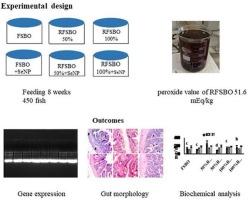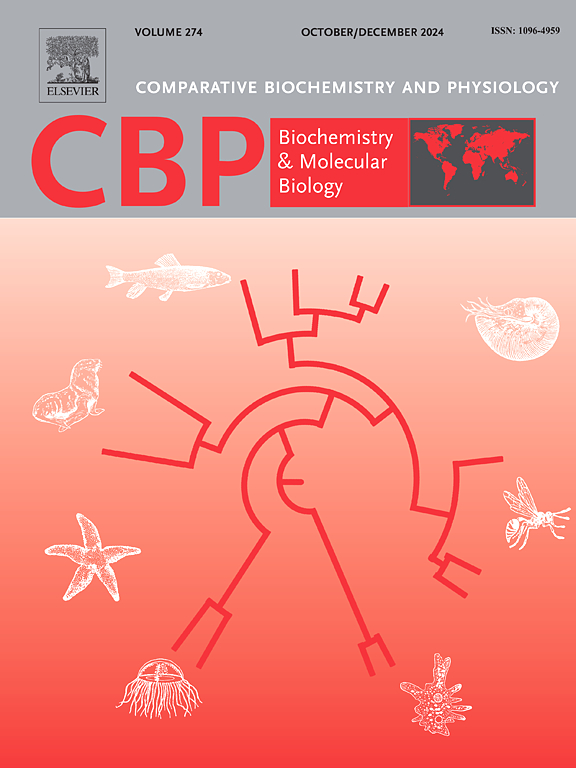Growth performance, lipid metabolism, gut histoarchitecture and immune and antioxidant related gene expression in juvenile Asian sea bass, Lates calcarifer fed peroxidized lipids with or without dietary selenium nanoparticles
IF 1.8
3区 生物学
Q4 BIOCHEMISTRY & MOLECULAR BIOLOGY
Comparative Biochemistry and Physiology B-Biochemistry & Molecular Biology
Pub Date : 2025-09-08
DOI:10.1016/j.cbpb.2025.111161
引用次数: 0
Abstract
This study evaluated the effects of dietary recovered frying soybean oil (RFSBO) and selenium nanoparticles (SeNPs) on growth performance, hepatic metabolism, intestinal morphology, and the expression of antioxidant, immune, and growth-related genes in juvenile Asian sea bass (Lates calcarifer, 41.5 ± 0.1 g) reared under high temperature (32–33 °C) and high salinity (38–40 ppt). Six diets were formulated: fresh soybean oil (FSBO), FSBO + SN (4 mg/kg SeNPs), 50 % RFSBO, 50 % RFSBO + SN, 100 % RFSBO, and 100 % RFSBO + SN. Fish (n = 450) were randomly assigned to 18 tanks and fed to apparent satiation three times daily for eight weeks. Fish fed 50 % RFSBO + SN achieved similar final weights to the FSBO group but with significantly better feed conversion ratio, improved gut wall, epithelial, and villus height, and lower malic enzyme activity, indicating reduced metabolic stress. Hepatic triglycerides were significantly lower in this group than in FSBO-fed fish, while glycogen content was maintained. In contrast, 100 % RFSBO caused histological damage, oxidative stress, elevated isocitrate dehydrogenase activity, and lipid imbalance, with SeNPs offering only partial mitigation. SeNP supplementation upregulated gpx1, lyz, il-1β, and igf1 expression under moderate oxidative stress but had limited effects under severe conditions. Overall, RFSBO can replace up to 50 % of dietary FSBO without compromising growth or intestinal health when combined with SeNPs, but higher levels reduce SeNP efficacy. These findings support the use of moderate RFSBO inclusion with SeNP supplementation to sustain fish health and performance under challenging environmental conditions.

饲料中添加或不添加纳米硒的过氧化物脂类对亚洲黑鲈幼鱼生长性能、脂质代谢、肠道组织结构以及免疫和抗氧化相关基因表达的影响。
本研究评估了饲料中添加回收油炸大豆油(RFSBO)和纳米硒(SeNPs)对高温(32-33 °C)和高盐度(38-40 ppt)饲养的亚洲海鲈鱼幼鱼(Lates calcarifer, 41.5 ± 0.1 g)生长性能、肝脏代谢、肠道形态以及抗氧化、免疫和生长相关基因表达的影响。配制6种饲粮:新鲜大豆油(FSBO)、FSBO + SN(4 mg/kg SeNPs)、50 % RFSBO、50 % RFSBO + SN、100 % RFSBO和100 % RFSBO + SN。鱼(n = 450)被随机分配到18个鱼缸中,每天三次喂饱,持续八周。饲喂50% % RFSBO + SN的鱼最终体重与FSBO组相近,但饲料系数显著提高,肠壁、上皮和绒毛高度提高,苹果酶活性降低,表明代谢应激降低。肝脏甘油三酯显著低于fsbo饲料组,同时糖原含量保持不变。相比之下,100 % RFSBO引起组织损伤、氧化应激、异柠檬酸脱氢酶活性升高和脂质失衡,而SeNPs仅能部分缓解。在中等氧化应激条件下,补充SeNP可上调gpx1、lyz、il-1β和igf1的表达,但在严重氧化应激条件下影响有限。总的来说,当与SeNPs联合使用时,RFSBO可以替代高达50% %的膳食FSBO,而不会影响生长或肠道健康,但较高的水平会降低SeNP的功效。这些发现支持在具有挑战性的环境条件下使用适度的RFSBO和SeNP补充剂来维持鱼类的健康和性能。
本文章由计算机程序翻译,如有差异,请以英文原文为准。
求助全文
约1分钟内获得全文
求助全文
来源期刊
CiteScore
4.60
自引率
4.50%
发文量
77
审稿时长
22 days
期刊介绍:
Comparative Biochemistry & Physiology (CBP) publishes papers in comparative, environmental and evolutionary physiology.
Part B: Biochemical and Molecular Biology (CBPB), focuses on biochemical physiology, primarily bioenergetics/energy metabolism, cell biology, cellular stress responses, enzymology, intermediary metabolism, macromolecular structure and function, gene regulation, evolutionary genetics. Most studies focus on biochemical or molecular analyses that have clear ramifications for physiological processes.

 求助内容:
求助内容: 应助结果提醒方式:
应助结果提醒方式:


